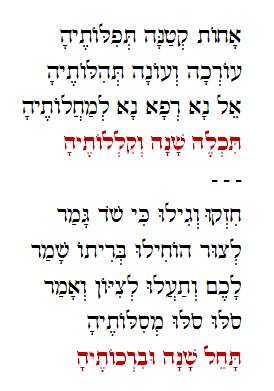רָבָא בָּתַר צְלוֹתֵיהּ אָמַר הָכִי: ״אֱלֹהַי, עַד שֶׁלֹּא נוֹצַרְתִּי אֵינִי כְּדַאי, וְעַכְשָׁיו שֶׁנּוֹצַרְתִּי כְּאִלּוּ לֹא נוֹצַרְתִּי. עָפָר אֲנִי בְּחַיַּי, קַל וָחוֹמֶר בְּמִיתָתִי, הֲרֵי אֲנִי לְפָנֶיךָ כִּכְלִי מָלֵא בּוּשָׁה וּכְלִימָּה. יְהִי רָצוֹן מִלְּפָנֶיךָ ה׳ אֱלֹקַי, שֶׁלֹּא אֶחֱטָא עוֹד, וּמַה שֶּׁחָטָאתִי לְפָנֶיךָ מָרֵק בְּרַחֲמֶיךָ הָרַבִּים, אֲבָל לֹא עַל יְדֵי יִסּוּרִין וָחֳלָאִים רָעִים״. וְהַיְינוּ וִידּוּי דְרַב הַמְנוּנָא זוּטֵי בְּיוֹמָא דְכִפּוּרֵי.
My God, before I was created I was worthless,
and now that I have been created it is as if I had not been created, I am no more significant.
I am dust in life, all the more so in my death.
I am before You as a vessel filled with shame and humiliation.
Therefore, may it be Your will, Lord my God, that I will sin no more,
and that those transgressions that I have committed,
cleanse in Your abundant mercy;
but may this cleansing not be by means of suffering and serious illness, but rather in a manner I will be able to easily endure.
And this is the confession of Rav Hamnuna Zuti on Yom Kippur.
When Mar, son of Ravina, would conclude his prayer, he said the following:
My God, guard my tongue from evil and my lips from speaking deceit.
To those who curse me let my soul be silent
and may my soul be like dust to all.
Open my heart to Your Torah,
and may my soul pursue your mitzvot.
And save me from a bad mishap, from the evil inclination,
from a bad woman, and from all evils that suddenly come upon the world.
And all who plan evil against me,
swiftly thwart their counsel, and frustrate their plans.
May the words of my mouth and the meditation of my heart find favor before You,
Lord, my Rock and my Redeemer.
Master of the Universe, it is revealed before You
that when the Temple is standing, one sins and offers a sacrifice.
And although only its fat and blood were offered from that sacrifice on the altar, his transgression is atoned for him.
And now, I sat in observance of a fast and my fat and blood diminished.
May it be Your will that my fat and blood that diminished be considered as if I offered a sacrifice before You on the altar,
and may I find favor in Your eyes.
Having cited statements that various Sages would recite after their prayers, the Gemara cites additional passages recited by the Sages on different occasions.
Achot Ketana

תַּנְיָא, רַבִּי שִׁמְעוֹן בֶּן אֶלְעָזָר אוֹמֵר: עֶזְרָא תִּיקֵּן לָהֶן לְיִשְׂרָאֵל שֶׁיְּהוּ קוֹרִין קְלָלוֹת שֶׁבְּתוֹרַת כֹּהֲנִים קוֹדֶם עֲצֶרֶת, וְשֶׁבְּמִשְׁנֵה תוֹרָה קוֹדֶם רֹאשׁ הַשָּׁנָה. מַאי טַעְמָא? אָמַר אַבָּיֵי וְאִיתֵּימָא רֵישׁ לָקִישׁ: כְּדֵי שֶׁתִּכְלֶה הַשָּׁנָה וְקִלְלוֹתֶיהָ.
Whose breasts are not yet formed.
What shall we do for our sister
When she is spoken for?




